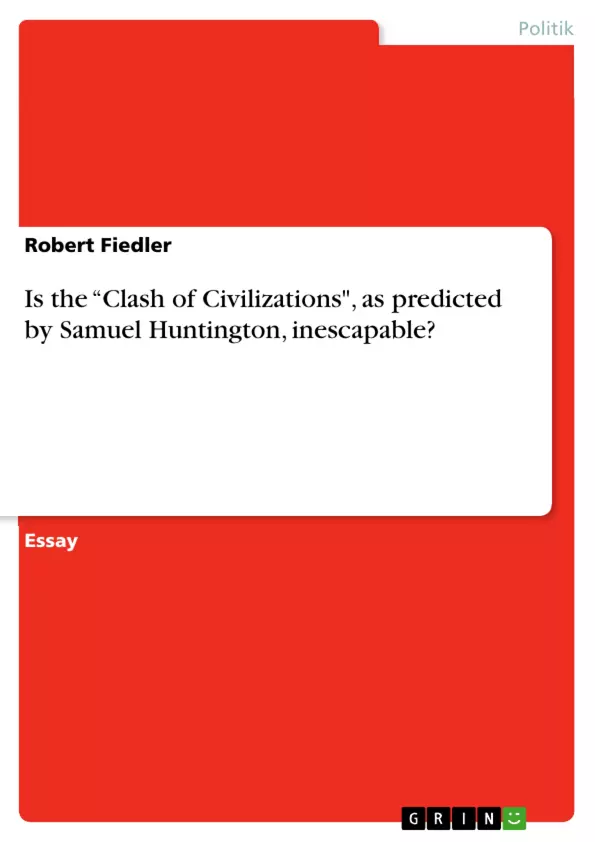Indeed, if one reconsiders the devastating terrorist attacks of 9/11 and the war in Iraq some might recognize “evidence of the clash of civilisations occurring, pitting Western and Islamic civilisations against each other” (Rajendram, 2002, p. 217). In order to underscore his rather pessimistic thesis, Huntington provides six causes of conflicts between civilisations such are different views and values, the growing awareness of different civilisations among the people, the weakening of nation states and the replacement of national identity by religion (Huntington, 1993, pp. 25–26). Furthermore, he argues that non-western countries will increasingly turn away from Westernization due to an increasing indigenisation and that “cultural characteristics and differences are less mutable and hence less easily compromised and resolved than political and economical ones” (Huntington, 1993, p. 27). Finally he points to the growth of economic regionalism contributing to the “cohesiveness of various civilisational groups” (O'Hagan, 1995, p. 20). It is because of these reasons that “the most important conflicts of the future will occur along the cultural fault lines separating these civilisations from one another” (Huntington, 1993, p. 25). Huntington not only provided a prediction model for future conflicts, moreover he intends to introduce a new superior paradigm to the realist paradigm (Huntington, 1996, p. 34). There are only few theoretical models in the recent history of International Relations that received such a plethora of multidisciplinary response as the “Clash of Civilisations?” did. The intention of this paper is not to give a comprehensive review of the arguments for or against the “Clash of Civilisations?” nor will it refute the thesis of Huntington. Rather, this paper will analyze if the clash of civilisations as predicted by Samuel Huntington is necessarily inevitable or if the existing international structures can help to avoid this pessimistic prediction. In order to find a conclusion, this paper is separated in two sections. First it will outline major flaws and imprecise fundamentals in Huntington’s argumentation and thereby demonstrate that theory-immanent flaws do not support the prediction of a clash of civilisations. In a second section, this paper argues that multilateralism will prevent a clash of civilisation in order to provide a more optimistic view.
Inhaltsverzeichnis
- Die These vom "Clash of Civilizations"
- Kritik an Huntington's Argumentation
- Multilateralismus als Gegenmittel
- Fazit
Zielsetzung und Themenschwerpunkte
Diese Arbeit analysiert die These vom "Clash of Civilizations", wie sie von Samuel Huntington aufgestellt wurde, und untersucht, ob dieser Konflikt unvermeidlich ist oder ob bestehende internationale Strukturen dazu beitragen können, diese pessimistische Vorhersage zu verhindern.
- Die These vom "Clash of Civilizations" und ihre Kritik
- Die Rolle von Zivilisationen in der internationalen Politik
- Die Bedeutung von Multilateralismus zur Vermeidung von Konflikten
- Die Bedeutung von Nationalismus und ethnischen Konflikten
- Die Grenzen des "Clash of Civilizations"-Paradigmas
Zusammenfassung der Kapitel
- Die These vom "Clash of Civilizations": Dieses Kapitel stellt die These vom "Clash of Civilizations" von Samuel Huntington vor und erklärt die zentralen Argumente des Autors. Es werden die wichtigsten Ursachen für Konflikte zwischen Zivilisationen nach Huntington beschrieben, wie beispielsweise unterschiedliche Werte und Ansichten, das wachsende Bewusstsein für andere Zivilisationen und die Schwächung von Nationalstaaten.
- Kritik an Huntington's Argumentation: Dieses Kapitel kritisiert die Argumentation von Huntington und beleuchtet die Schwächen seiner These. Es wird argumentiert, dass das Konzept der Zivilisationen zu vage ist und dass es in der Realität oft zu Überlappungen und Unschärfen kommt. Darüber hinaus werden die fehlenden empirischen Belege für die These vom "Clash of Civilizations" aufgezeigt.
- Multilateralismus als Gegenmittel: Dieses Kapitel argumentiert, dass Multilateralismus ein wirksames Mittel zur Vermeidung von Konflikten ist. Es wird dargelegt, wie internationale Institutionen und multilaterale Zusammenarbeit dazu beitragen können, die Zusammenarbeit zwischen verschiedenen Ländern und Zivilisationen zu fördern und Konflikte zu entschärfen.
Schlüsselwörter
Die wichtigsten Schlüsselwörter und Fokusthemen dieser Arbeit sind: "Clash of Civilizations", Samuel Huntington, Zivilisation, Multilateralismus, Nationalismus, ethnische Konflikte, internationale Politik, Konfliktprävention.
Häufig gestellte Fragen
Was besagt die These vom "Clash of Civilizations"?
Samuel Huntington postuliert, dass zukünftige Konflikte nicht mehr ideologisch oder ökonomisch, sondern entlang kultureller Trennlinien zwischen Weltzivilisationen verlaufen.
Welche Kritikpunkte gibt es an Huntingtons Theorie?
Kritiker bemängeln vage Definitionen von "Zivilisation", fehlende empirische Belege und die Vernachlässigung von Konflikten innerhalb einer Kultur.
Kann Multilateralismus einen "Kampf der Kulturen" verhindern?
Ja, die Arbeit argumentiert, dass internationale Institutionen und multilaterale Zusammenarbeit helfen können, kulturelle Spannungen zu entschärfen.
Welche Rolle spielt Religion in Huntingtons Modell?
Religion wird als zentraler Bestandteil kultureller Identität gesehen, der nationale Identitäten zunehmend ersetzt und Konfliktpotential birgt.
Ist der Konflikt laut der Arbeit unvermeidlich?
Die Arbeit vertritt eine optimistischere Sicht und zeigt auf, dass Theoriefehler Huntingtons die Unvermeidbarkeit nicht stützen.
- Citation du texte
- MSc. M.A. Robert Fiedler (Auteur), 2009, Is the “Clash of Civilizations", as predicted by Samuel Huntington, inescapable?, Munich, GRIN Verlag, https://www.grin.com/document/163704



